Writers have a reputation for avoiding the spotlight. After all, they spend all those hours… weeks… months in front of a screen or a notepad, living in their heads. (That’s where the real stories are!) So it’s always fascinating to see what Hollywood does with literary figures when they decide to give them starring roles—something that happens surprisingly often!
Back in the fall, we took a look at authors taking their star turn in nine feature films—all of which premiered before 2000. But over the last two decades, there have been many more films which have turned beloved writers into onscreen protagonists. Here’s a fresh look at nine post-2000 movies full of fantastical imagination, murder, doomed love, road trips, and even a ménage-a-trois! Perhaps it’s time to re-examine the notion that writers live quiet, sedate lives…
Finding Neverland (2004)
Enchanted by the widowed Sylvia Llewelyn Davies (Kate Winslet) and her four sons—including one named Peter—J.M. Barrie (Johnny Depp) finds inspiration in the Davies family and revitalizes his playwriting career by creating his most famous character in the early 1900s, culminating in the success of Peter Pan; or, the Boy Who Wouldn’t Grow Up. Depp sets aside some of his typical eccentricities to play Barrie in a relatively understated performance, while Winslet is pale and beautiful as Sylvia, slowly dying of a mysterious illness. Director Marc Forster weaves in a fantastical element—Sylvia is shown wandering into Neverland on her own as a metaphor for her death—but the basic facts are heartwarmingly, as well as poignantly, true. Barrie also unofficially adopted the boys after Sylvia’s death.
Other portrayals of Barrie include the miniseries The Lost Boys, where he’s played by Ian Holm.
Capote (2005)
Though he wrote short fiction and novels including Breakfast at Tiffany’s and Other Voices, Other Rooms, Truman Capote’s lasting literary reputation is based in large part on his 1965 “nonfiction novel” In Cold Blood, a true-crime novelization of the murder of a Kansas family. Capote focuses on that small window of his career, and star Philip Seymour Hoffman turns in a tour de force performance as the unusual, inquisitive writer with distinctive voice and a wicked turn of phrase. (He won the Oscar for the role.) The film also includes glimpses of Capote’s lifelong friendship with Harper Lee (Catherine Keener), author of To Kill a Mockingbird.
Other portrayals of Capote include 54 (Louis Negin); Isn’t She Great (Sam Street); The Audrey Hepburn Story (Michael J. Burg); Infamous (Toby Jones as Capote, and Sandra Bullock as Harper Lee); and the upcoming FX series Feud: Capote vs. the Swans (Tom Hollander).
Miss Potter (2006)
Beatrix Potter was raised in the Victorian era with a quick mind and an interest in natural science and astronomy—particularly mycology—but she became famous for writing and illustrating classic children’s stories about animals, in particular a mischievous rabbit named Peter. And that’s what Miss Potter highlights—getting “The Tale of Peter Rabbit” published, and also the various reasons why Beatrix is so reluctant to get married. Renee Zellweger is charming in the role, but here’s hoping that one day we get a more complete picture of all the things that made Potter such a pioneer in her era, besides creating the books many of us adored as children.
Other portrayals of Potter include the anthology TV series The World of Peter Rabbit and Friends (Niamh Cusack); Peter Rabbit (Rose Byrne as Bea, a re-imagined Potter); and the made-for-television film Roald & Beatrix: The Tale of the Curious Mouse (with Dawn French as Potter and Harry Tayler as the young Dahl).
Bright Star (2009)
Could there be anything more romantic than the brief, passionate love between a poet and his muse? Bright Star is the story of John Keats (Ben Whishaw)—who died of tuberculosis at age 25 in 1821—and Fanny Brawne (Abbie Cornish), his lover and inspiration, the real-life personification of the kind of muse he famously invoked in poems like “Endymion.” He gives her poetry lessons and sparks begin to fly; their romance, while doomed, is delightful to watch as it evolves from tentative friendship to something much deeper. They obtain permission to marry once he returns from a trip to Italy and recovers from his illness… but he dies before they can meet again.
Kill Your Darlings (2013)
Packed with portrayals of Beat Generation members but hinging on a real-life murder, Kill Your Darlings revolves around the inner circle of mid-century authors/poets/radical thinkers Allen Ginsberg (Daniel Radcliffe), William S. Burroughs (Ben Foster), Jack Kerouac (Jack Huston) and Lucien Carr (Dane DeHaan), and Carr’s fraught relationship with the stalker-ish David Kammerer (Michael C. Hall). More suspenseful crime drama than actual portrayal of the Beats, the film is energetic and filled with charismatic performances but didn’t earn a whole lot at the box office.
Other portrayals of the Beats include Howl (with James Franco as Ginsberg, Todd Rotondi as Kerouac), and Big Sur (with Jean-Marc Barr as Kerouac).
Saving Mr. Banks (2013)
We all know Disney adapted Mary Poppins, written by prickly author P.L. Travers. But did we know just how resistant she was about having work turned into a film? Much less a musical? Or find herself fully charmed by Walt Disney, in spite of her best efforts? Well, now we do. On the one hand, the film stars Tom Hanks and Emma Thompson, two of the most likeable actors making movies these days, and has its own considerable Disneyfied charm. But writers may want to look at it as a cautionary tale: Disney originally gave Travers script approval and promised there would be no animation in the film—then did what exactly what he liked with her characters anyway. At least Travers’ earnings from the movie helped replenish her depleted coffers.
The End of the Tour (2015)
David Foster Wallace, who died by suicide in 2008, left behind a legacy of adoring fans, and at least one Great American Novel, Infinite Jest, a book many find as challenging (and as rewarding) to read as Joyce’s Ulysses. In The End of the Tour, journalist David Lipsky (Jesse Eisenberg) recalls the time he spent travelling with and interviewing Wallace (Jason Segel) for an article in Rolling Stone magazine. Wallace talks to the reporter about his alcoholism, dog ownership, and his own identity, and the two clash after women come into the picture and some of Lipsky’s questions make the author uneasy. The movie is based on the award-winning memoir by Lipsky, Although of Course You End Up Becoming Yourself, about the five-day road trip he took with Wallace in 1996, just after the successful publication of Infinite Jest.
Colette (2018)
In the late 19th century, the writer Henry Gauthier-Villars (who publishes under the pen name Willy) marries the young Sidonie-Gabrielle Colette—and nearly loses her when she catches him cheating on her. After they reconcile, he suggests she try writing a novel, and it turns out to be a hit. Colette (Keira Knightley) writes multiple Claudine books in the ensuing years; after finding herself involved in a ménage-a-trois with an American debutante who is also having an affair with Willy (Dominic West), she fictionalizes the situation in her next novel. When the pair eventually falls into financial ruin, Willy sells all the rights to Colette’s books without her permission—and she leaves him to achieve even greater heights, including her book The Vagabond and novella Gigi.
Other portrayals including Becoming Colette (Mathilda May).
Shirley (2020)
Centered on the intense, bespectacled Shirley Jackson, whose story “The Lottery” has become something of a (potentially traumatic) rite of passage for generations of young readers, Shirley is fueled by a stellar performance from Elisabeth Moss. The movie is based on the 2014 novel of the same name, which spins a “largely fictional story” around the real-life author and her family. In the film, Jackson is writing her 1951 book Hangsaman, and she and her husband Stanley invite newlyweds Fred and Rose Nemser to work for them and move into their home. Much of the story hinges on the increasingly fraught interactions between the two couples, and particularly Rose and Shirley, who seems happiest when safely ensconced in doing what she wants—writing—and doesn’t seem to greatly mind her husband’s various affairs. The movie’s version of Stanley and Shirley have their own strange groove, and they—happily? unhappily?—exist within it.
***
Do you have other favorite examples of relatively recent biopics and other movies about writers not mentioned above? What other authors should have their lives turned into movies? Share your thoughts in the comments below!
Randee Dawn is the author of the funny, fantastical pop culture novel Tune in Tomorrow, which was a finalist in the 2023 Next Generation Indie Awards. She’s also the co-editor of The Law & Order: SVU Unofficial Companion and co-edited the anthology Across the Universe: Tales of Alternative Beatles. An entertainment journalist who writes for The Los Angeles Times, Variety, Today.com, and many other publications, Randee is working on her follow-up to Tune in Tomorrow and lives in Brooklyn with her spouse and a fluffy, sleepy Westie.










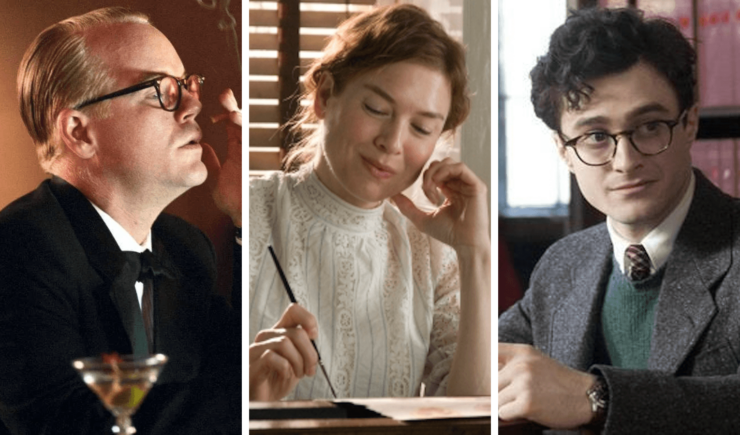
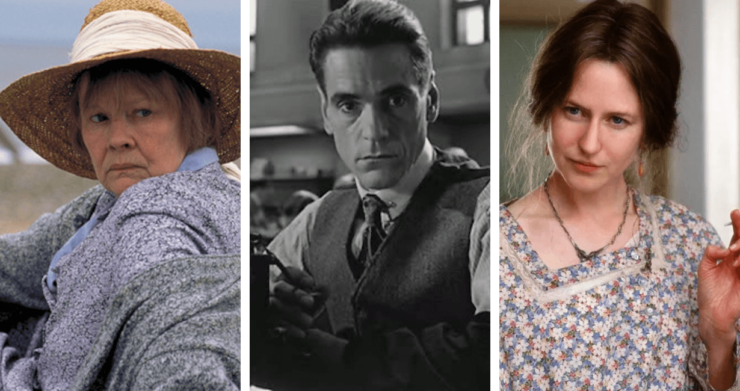
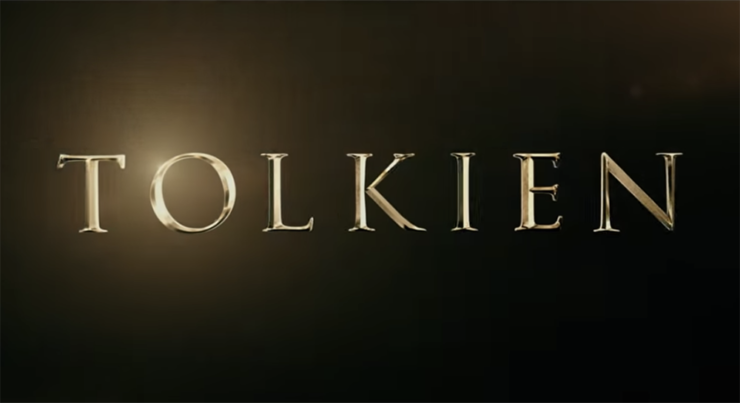
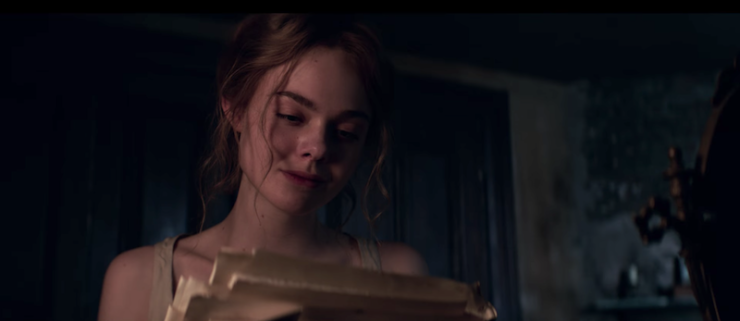
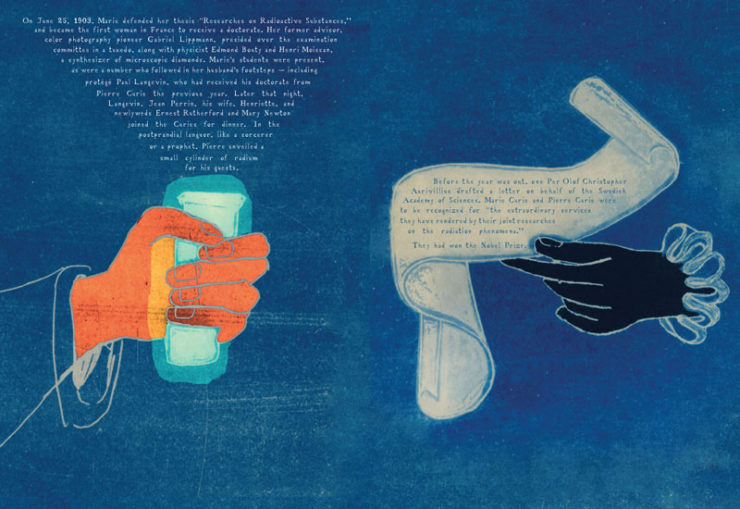
There are the two recent movies about Emily Dickinson, A Quiet Passion and Wild Nights with Emily. (I am Emily Dickinson’s first cousin some 5 or 6 times removed.)
Daniel Radcliffe also played Rudyard Kipling’s son, John, in My Boy Jack, around 2008, I believe.
Tolkien (2019), anyone? Starring Nicholas Hoult and Lily Collins.
“Can You Ever Forgive Me?” is really good.
https://youtu.be/UvJIaNsf_bY?si=oquLUUYiONz08Z_u
I’m still waiting for the movie adaptation of “The Return of William Proxmire”.
“Becoming Astrid,” about Pippi Longstocking creator Astrid Lindgren, is good, although it covers her early life before she became a writer, so maybe that’s out.
Purely fictional, “Stranger Than Fiction” and biopic, “Trumbo.”
How do I read the whole piece? Clicking on “more” does nothing.
Button “(more…)” does not work
Can’t read the whole article. “More” link seems to be broken.
I would love to see every one of these movies. The only one I’ve seen is Saving Mr Banks.